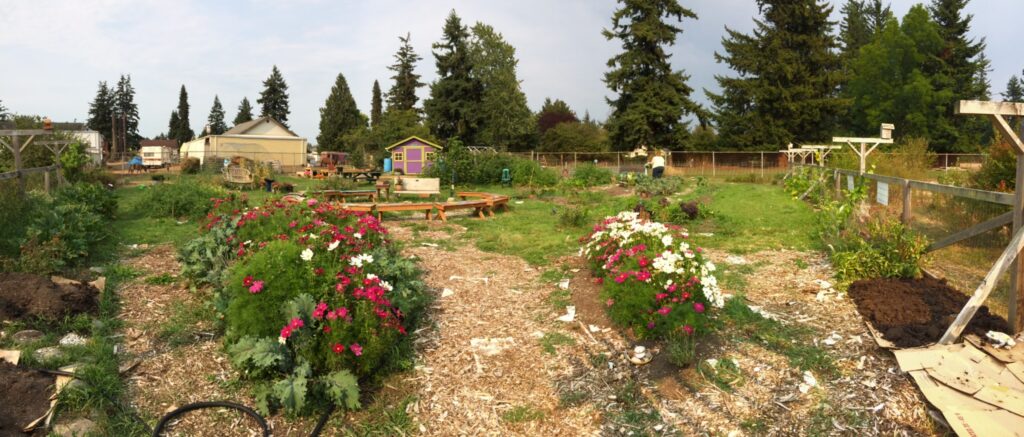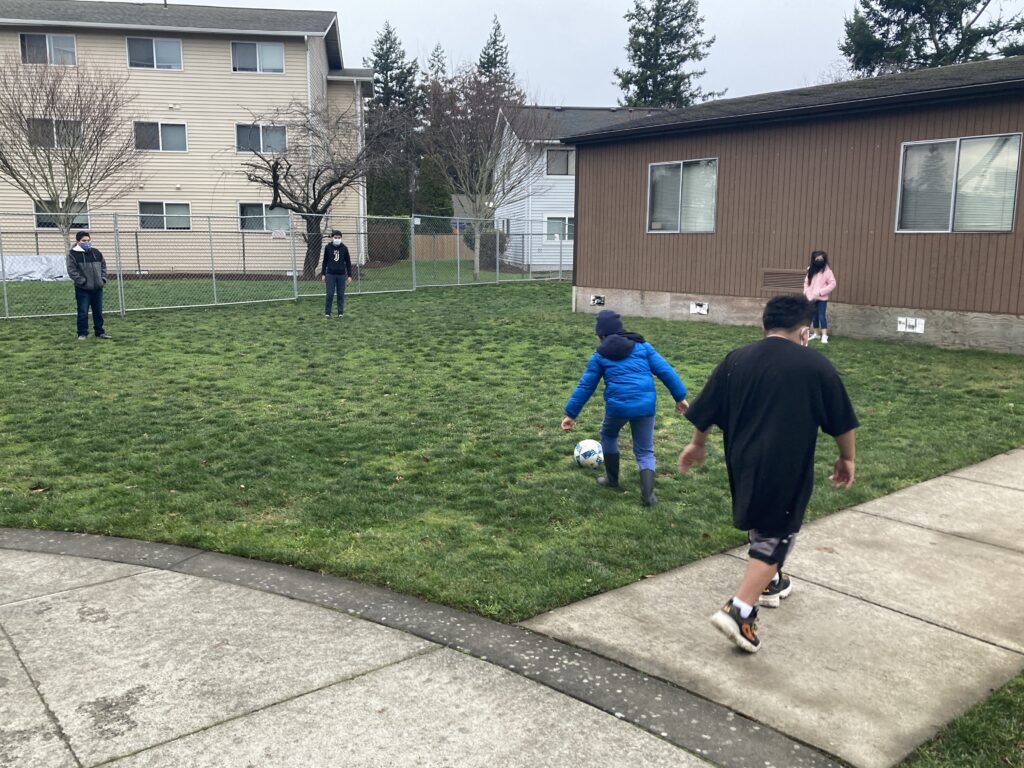
Garden at Birchwood Elementary, the site that Connections students and educators traveled to for garden lessons.
Written by Maddie Smith, AmeriCorps Food Educator
For about two months leading up to the new year, I participated in the Connections program at Shuksan Middle School. Several local nonprofits teamed up with Bellingham Public Schools to connect students in grades two through eight with technology and academic support to complete online school, free breakfast and lunch, outdoor enrichment programs and, most importantly, with each other.
For the first time since March, the halls and classrooms of middle schools buzzed with activity. Pandemic precautions warranted masks, class sizes of eight or fewer, outdoor meals and plenty of hand sanitizer. Even with these differences, I think students were excited to see each other and educators in a non-Zoom setting.
In late fall during a usual school year, Common Threads food educators would be working with students in the classroom delivering cooking lessons while our gardens are resting for the winter. That, among many other things, has changed. Common Threads’ programming at Connections was outdoors and food educators had the odds stacked against us for delivering fun, engaging garden lessons in the late fall and winter months. The garden at Shuksan Middle school recently became a construction site, so students and food educators crossed two streets to get to the garden at Birchwood Elementary School on the days when the high winds and heavy rains subsided.
Along with garden lessons, food educators offered meal time support during the Connections program. For me, this meant searching for things to weigh down the canopies that sheltered students during breakfast and lunch in the midst of Bellingham’s wet, windy winter. It also meant a few indoor garden lessons during high wind advisories.
Despite the obstacles, I really connected with the students during the handful of weeks we spent together. I learned just how resilient they were after the COVID-19 pandemic collectively rocked our world — a world that they have just begun to interact with. Re-imagining activities that enforce social distancing was a challenge, but the staff and students at Shuksan got creative and found some ways to have fun amid a pandemic.
A staff member from Wild Whatcom brought a soccer ball to the middle school one day and the students’ response amazed me. They went from shivering and wanting to go back inside to laughing and chasing down the ball that their classmate booted underneath a portable. The introduction of the soccer ball brought out the warmth in me, too. My pores were dripping sweat after chasing down the ball that was overshot by a third grader and underneath my mask I was smiling about the joys of soccer.
While I relived my childhood, I built relationships with these students and they built relationships with each other. The soccer ball transcended a few differences between us. It turns out running around chasing a ball is fun whether you are six or sixty. In an instant, the patch of grass beside the school transformed into a playing field. It’s a place where we can meet in the middle of skill level and break down language barriers.
When COVID-19 ripped students out of their schools, young English language learners lost an integral part of their social language practice. The Connections program brought students of various language backgrounds together again to learn and grow with each other. This was an incredible opportunity, but it came with some challenges. At first, my inability to communicate in languages other than English was a barrier to connecting with students. I found it difficult to communicate non-verbally about certain things and COVID’s demand for masks and distance from students further complicated things.
Regardless of differences in language, when the soccer ball was brought out at lunch, the crisp November air was filled with movement and laughter. Words didn’t need to be spoken for someone to make the first kick, inspiring a chain reaction of kicking and running around. This simple object offered an avenue to connect with students who spoke other languages. The ball was a universally-recognized symbol of fun and raised the spirits of students and educators alike.
Even though I was only a part of Connections for a few short months, I came out of the program with many lessons. Among them, a reminder to avoid reinventing the wheel. The pandemic threw a wrench in all of our plans, but there are some things that have stood the test of time and tumultuous circumstances. A game of soccer in a school yard is one of those things.

A group of students kick around a soccer ball during the Connections Program at Shuksan Middle School.
